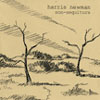 The real tragedy of the obligatory Fahey reference accompanying everysort of instrumental guitar music criticism these days is that in acase like this, when a namedrop is relevant, even downright essential,one feels like chump or a short-cutter for following through with it.With this debut disc, Harris Newman joins label-mate SteffenBasho-Junghans as the second new guitar graduate to successfully minethe Takoma catalog and produce something that is as fresh as it isbackward-looking. The first third of Non-sequiturs had me thinking Ihad slipped The Best of John Fahey into the changer by mistake. Newmanattacks Fahey's windswept blues and teetering, fingerpicked flourisheswith a tenacity and a passion that keeps the songs from falling intodull repetition. The melancholia-meets-agitation vibe present in muchof Fahey's music is at work in Newman's melodic sense and his play oftension and release; songs like "Sometimes a Bad Attitude is All itTakes" and "The Bullheaded Stranger" match Fahey's early works both intheir ambitious structure and their quasi-absurd titles. Non-sequiturswould not be such a pleasing listen, though, if Newman had not lentthem his unique touch. The guitarist's activity in the Montreal avantscene has no doubt inspired some of the disc's more surprising moments,most notably those featuring percussion from Godspeed member BruceCawdron. Cawdron's playing proves versatile, blending with theshuffling blues early on the disc and providing more abstractaccompaniment via pandeiro, bodhran, and exquisitely played bowedcymbals as Newman's playing gets more spacious. The guitar bottoms outon "God is in the Details," gathering a skeletal, glacier-paced bluesfrom groaning lap-steel plucking atop ghostly cymbal drones. Thepercussion is considerably detached in the mix for the length ofNon-sequiturs giving a surreal quality to certain sections, primarilythose in which Newman introduces improvisation or a kind of raga-styleabandon into his playing. This effect is most impressive on the disc's15-minute climax, "Forest for the Trees." The track features Newmandrifting uncomfortably over three somber chords as the drums bump andshake, back and forth against his nervous timing; as his playingdecays, the percussion ascends in a clatter of protest. The imageconjured is one of an anxious guitar player, playing to the creakingsounds in his room at night. One quality often lacking among thefollowers of Fahey (of which Newman is one of the most loyal) is theability to transcend technical mastery and create truly soulful,evocative music. Non-sequiturs confirms Harris Newman an exception tothis majority.
The real tragedy of the obligatory Fahey reference accompanying everysort of instrumental guitar music criticism these days is that in acase like this, when a namedrop is relevant, even downright essential,one feels like chump or a short-cutter for following through with it.With this debut disc, Harris Newman joins label-mate SteffenBasho-Junghans as the second new guitar graduate to successfully minethe Takoma catalog and produce something that is as fresh as it isbackward-looking. The first third of Non-sequiturs had me thinking Ihad slipped The Best of John Fahey into the changer by mistake. Newmanattacks Fahey's windswept blues and teetering, fingerpicked flourisheswith a tenacity and a passion that keeps the songs from falling intodull repetition. The melancholia-meets-agitation vibe present in muchof Fahey's music is at work in Newman's melodic sense and his play oftension and release; songs like "Sometimes a Bad Attitude is All itTakes" and "The Bullheaded Stranger" match Fahey's early works both intheir ambitious structure and their quasi-absurd titles. Non-sequiturswould not be such a pleasing listen, though, if Newman had not lentthem his unique touch. The guitarist's activity in the Montreal avantscene has no doubt inspired some of the disc's more surprising moments,most notably those featuring percussion from Godspeed member BruceCawdron. Cawdron's playing proves versatile, blending with theshuffling blues early on the disc and providing more abstractaccompaniment via pandeiro, bodhran, and exquisitely played bowedcymbals as Newman's playing gets more spacious. The guitar bottoms outon "God is in the Details," gathering a skeletal, glacier-paced bluesfrom groaning lap-steel plucking atop ghostly cymbal drones. Thepercussion is considerably detached in the mix for the length ofNon-sequiturs giving a surreal quality to certain sections, primarilythose in which Newman introduces improvisation or a kind of raga-styleabandon into his playing. This effect is most impressive on the disc's15-minute climax, "Forest for the Trees." The track features Newmandrifting uncomfortably over three somber chords as the drums bump andshake, back and forth against his nervous timing; as his playingdecays, the percussion ascends in a clatter of protest. The imageconjured is one of an anxious guitar player, playing to the creakingsounds in his room at night. One quality often lacking among thefollowers of Fahey (of which Newman is one of the most loyal) is theability to transcend technical mastery and create truly soulful,evocative music. Non-sequiturs confirms Harris Newman an exception tothis majority.samples:
Read More

